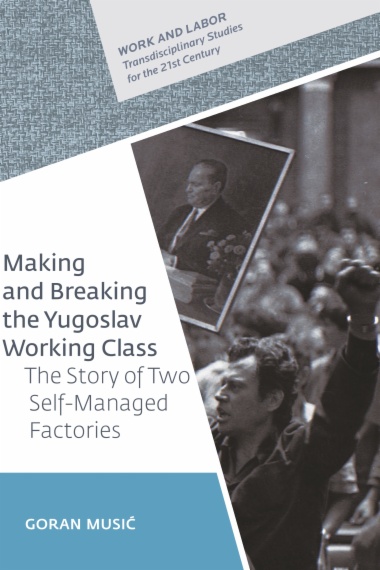Workers' self-management was one of the unique features of communist Yugoslavia. Goran Musić has investigated the changing ways in which blue-collar workers perceived the recurring crises of the regime. Two self-managed metal enterprises, one in Serbia another in Slovenia, provide the frame of the analysis in the time span between 1945 and 1989. These two factories became famous for strikes in 1988 that evoked echoes in popular discourses in former Yugoslavia. Drawing on interviews, factory publications and other media, local archives, and secondary literature, Musić analyzes the two cases, going beyond the clichés of political manipulation from the top and workers' intrinsic attraction to nationalism.
The author explains how, in the later phase of communist Yugoslavia, growing social inequalities among the workers and undemocratic practices inside the self-managed enterprises facilitated the spread of a nationalist and pro-market ideology on the shop floors. Yet rather than being a mass taken advantage of by populist leaders, the working class Musić presents is one with agency and voice, a force that played an important role in shaping the fate of the country. The book thus seeks to open a debate on the social processes leading up to the dissolution of Yugoslavia.
- Cover
- Front matter
- Series title page
- Title page
- copyright page
- Table of contents
- Figures and Tables
- Abbreviations
- Acknowledgments
- INTRODUCTION
- Unfulfilled Expectations
- Mighty Elites and Subservient Workers
- (Re)Discovering Labor
- Approaching Class and Nation in a Yugoslav Factory
- Sources and Chapter Overview
- CHAPTER ONE. TWO ROADS TO SELF-MANAGING SOCIALISM
- Two Blue-Collar Communities
- Differing Origins
- “Factories to the Workers”
- Market Socialism
- Losing Factory Unity
- CHAPTER TWO. FACTORY STRUCTURES AND EVERYDAY LIFE UNDER ASSOCIATED LABOR
- Reviving Revolution through Normative Acts
- The More Things Change
- Claiming Tito
- The Factory as a Collective
- CHAPTER THREE. SHADES OF BLUE-COLLAR WORKERS
- Proletariat in the Making
- Who Creates Value?
- Skill, Gender, and Place of Origin
- Veterans and the Youth
- Appendix 1
- CHAPTER FOUR. THE DRAGGING CRISIS, 1979–1986
- The Sudden Breakdown
- The Party at an Impasse
- TAM’s Pushback of Associated Labor
- IMR Tries to Catch Up
- CHAPTER FIVE. BREAKING THE PACT: WORKERS, LIBERALS, AND NATIONALISTS AGAINST THE STATUS QUO
- Cutting out the Middlemen
- The Stolen Golden Apples
- The Diligent Ones
- Appendix 2
- CHAPTER SIX. MOBILIZATIONS AT THE BOTTOM—REALIGNMENTS AT THE TOP, 1986–1988
- Reaching Beyond the Factory Gates
- A “Firm Hand” Inside Serbia
- Bypassing the Working Class in Slovenia
- Beggar Thy Neighbor
- CHAPTER SEVEN. WORKERS IN THE STREETS
- Two Outlets in Rakovica
- Deus Ex Machina
- Maribor’s Blue-Collar Wrath
- Post Festum
- CONCLUSION
- The Unsettled Working Class
- Liberal and Collectivist Self-Management
- In Search of Allies and Enemies
- Unanticipated Changes
- Bibliography
- Index
- Back cover

